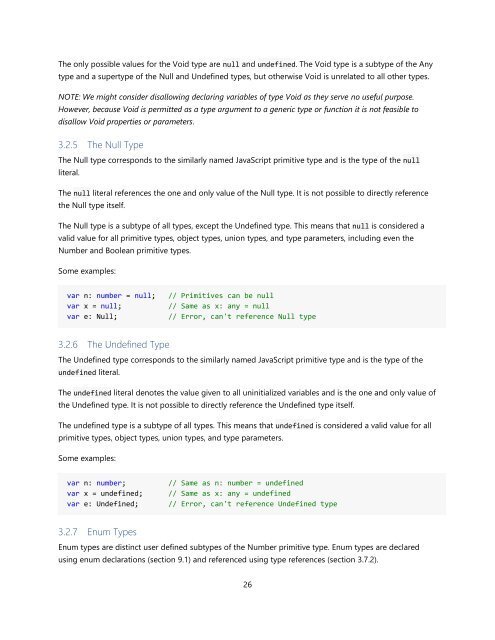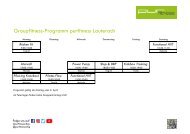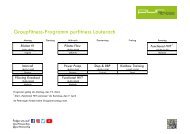TypeScript Language Specification v1.5
TypeScript Language Specification v1.5
TypeScript Language Specification v1.5
Create successful ePaper yourself
Turn your PDF publications into a flip-book with our unique Google optimized e-Paper software.
The only possible values for the Void type are null and undefined. The Void type is a subtype of the Any<br />
type and a supertype of the Null and Undefined types, but otherwise Void is unrelated to all other types.<br />
NOTE: We might consider disallowing declaring variables of type Void as they serve no useful purpose.<br />
However, because Void is permitted as a type argument to a generic type or function it is not feasible to<br />
disallow Void properties or parameters.<br />
3.2.5 The Null Type<br />
The Null type corresponds to the similarly named JavaScript primitive type and is the type of the null<br />
literal.<br />
The null literal references the one and only value of the Null type. It is not possible to directly reference<br />
the Null type itself.<br />
The Null type is a subtype of all types, except the Undefined type. This means that null is considered a<br />
valid value for all primitive types, object types, union types, and type parameters, including even the<br />
Number and Boolean primitive types.<br />
Some examples:<br />
var n: number = null;<br />
var x = null;<br />
var e: Null;<br />
// Primitives can be null<br />
// Same as x: any = null<br />
// Error, can't reference Null type<br />
3.2.6 The Undefined Type<br />
The Undefined type corresponds to the similarly named JavaScript primitive type and is the type of the<br />
undefined literal.<br />
The undefined literal denotes the value given to all uninitialized variables and is the one and only value of<br />
the Undefined type. It is not possible to directly reference the Undefined type itself.<br />
The undefined type is a subtype of all types. This means that undefined is considered a valid value for all<br />
primitive types, object types, union types, and type parameters.<br />
Some examples:<br />
var n: number;<br />
var x = undefined;<br />
var e: Undefined;<br />
// Same as n: number = undefined<br />
// Same as x: any = undefined<br />
// Error, can't reference Undefined type<br />
3.2.7 Enum Types<br />
Enum types are distinct user defined subtypes of the Number primitive type. Enum types are declared<br />
using enum declarations (section 9.1) and referenced using type references (section 3.7.2).<br />
26


















